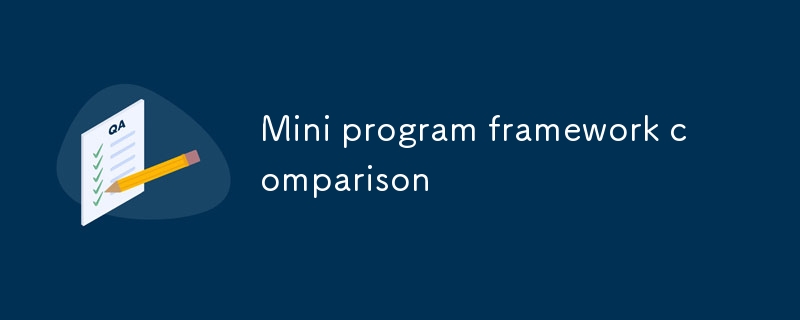Home >WeChat Applet >Mini Program Development >Mini program framework comparison
Mini program framework comparison
- DDDOriginal
- 2024-08-15 14:09:17701browse
This article provides a comparison of essential features for selecting mini-program frameworks. It focuses on cross-platform compatibility, user interface customization, development tools, community support, performance, security, and potential trade

Mini Program Framework Comparison
Essential Features for Mini Program Framework Selection
When selecting a mini-program framework, several key features are crucial to consider:
- Compatibility with Multiple Platforms: Ensure the framework supports the desired operating systems and devices.
- User Interface Customization: Evaluate the level of customization and flexibility the framework offers for creating user interfaces.
- Development Tools: Assess the availability of tools, libraries, and documentation to aid in development.
- Community Support: Consider the active user base, support forums, and documentation resources available.
- Performance and Efficiency: Analyze the framework's ability to optimize code and handle heavy workloads.
- Security Features: Ensure the framework provides adequate security measures and follows best practices.
Cross-Platform Compatibility of Mini-Program Frameworks
Cross-platform compatibility refers to the framework's ability to run consistently across different platforms and devices. The performance of mini-program frameworks in this aspect varies:
- Weex: Supports cross-platform compatibility across Android, iOS, and web platforms.
- Taro: Offers cross-platform development for React Native, React, and WeChat Mini Programs.
- Uni-App: Enables cross-platform development for iOS, Android, H5 (web), and Baidu Mini Apps.
- Flutter: Primarily designed for mobile app development but provides compatibility for web and desktop platforms.
Trade-Offs in Mini-Program Framework Evaluation
Choosing a mini-program framework involves considering potential trade-offs:
- Performance vs. Customization: Frameworks that offer high levels of customization may compromise performance.
- Community Support vs. Proprietary Features: Open-source frameworks with active communities provide extensive support, but proprietary frameworks may offer unique features.
- Development Speed vs. Code Quality: Rapid-development frameworks may facilitate quick project completion, but optimizing code quality requires careful evaluation.
- Security vs. Convenience: Frameworks prioritizing security may have stricter implementation requirements, while those emphasizing ease of use may compromise security.
- Cost vs. Value: Consider the potential costs asociadosted with choosing a paid or open-source framework.
The above is the detailed content of Mini program framework comparison. For more information, please follow other related articles on the PHP Chinese website!
Related articles
See more- WeChat Mini Program Simple DEMO layout, logic, and style exercises
- Detailed explanation and examples of WeChat applet wx.request (interface calling method)
- WeChat Mini Program - Detailed explanation of WeChat login, WeChat payment, and template messages
- WeChat applet (application account) simple example application and detailed explanation of the example
- Detailed explanation of WeChat applet for loop

